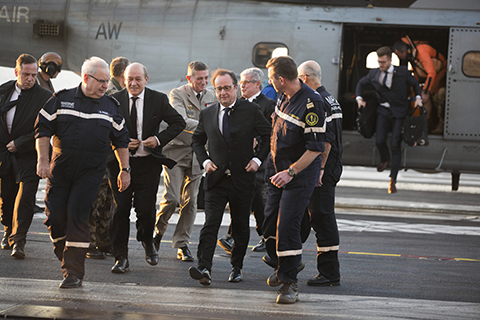 French President Francois Hollande (C) and French Defence Minister Jean-Yves Le Drian (3rd L) arrive on France's Charles de Gaulle aircraft carrier on December 4, 2015 off the coast of Syria. Hollande is expected to give a speech to the crew of the carrier which is off the coast of Syria, three weeks after he declared "war" on the jihadists after attacks on Paris in which 130 were killed. / AFP / POOL / Philippe de Poulpiquet
French President Francois Hollande (C) and French Defence Minister Jean-Yves Le Drian (3rd L) arrive on France's Charles de Gaulle aircraft carrier on December 4, 2015 off the coast of Syria. Hollande is expected to give a speech to the crew of the carrier which is off the coast of Syria, three weeks after he declared "war" on the jihadists after attacks on Paris in which 130 were killed. / AFP / POOL / Philippe de PoulpiquetON BOARD THE FRENCH AIRCRAFT CARRIER CHARLES DE GAULLE: President Francois Hollande visited France's aircraft carrier off the coast of Syria yesterday, while German lawmakers approved joining the intensifying fight against Islamic State jihadists.
Three weeks to the day since IS gunmen caused carnage in Paris, Hollande was expected to address the crew of the Charles de Gaulle, the ship at the heart of France's air campaign against IS targets in Syria and Libya. After British jets this week began bombing IS targets in Syria, the German parliament yesterday overwhelmingly agreed to the deployment of Tornado jets to fly reconnaissance missions.
Germany will also contribute a frigate and up to 1,200 troops, although only a few hundred are likely to be involved at first. Hollande declared "war" on IS after its followers killed 130 people in the French capital, and European nations have been fastest to respond. France invoked a clause requiring EU states to provide military assistance to wipe out the IS group in Iraq and Syria.
Welcoming the German parliament's approval by 445 votes in favor to 146 against, Hollande said it was "another example of the solidarity between France and Germany." A coalition of 60 countries has been battling IS since August 2014, mainly in Iraq. Many countries had been more reluctant to take action in Syria, with many wary of how military action could actually end up serving President Bashar Al-Assad's regime, which they view as no longer legitimate.
But the coordinated attacks by suicide bombers and gunmen in Paris appear to have focused minds. British jets struck an IS-held oil field on Wednesday, within hours of lawmakers backing Prime Minister David Cameron's call to help their European allies. After repeatedly ruling out the use of "boots on the ground", US President Barack Obama has agreed to send as many as 100 special forces to Iraq, with a mandate to carry out raids inside Syria.
Russian planes are also hitting IS targets, but the US accuses it of bombing other rebel groups in a bid to help Assad, a strong ally of Moscow.
Broad German support Even in Germany, where there has traditionally been reluctance to engage in military missions abroad, the government's decision to take direct action in Syria has largely met with support.
An opinion poll in Die Welt newspaper yesterday showed 58 percent backing for the deployment while 37 percent were against. The support came despite a large majority of 63 percent believing that the risk of a terror attack on German soil will rise as a result of the military action. Germany's Justice Minister Heiko Maas said the case for action was watertight legally. "The Germans can be certain that the deployment to Syria neither violates international law nor the constitution," he told the Tagesspiegel daily yesterday.
"We must stop this terrorist gang of murderers. That will not be achieved with military action alone, but neither would it be achieved without," he said. The package approved by parliament includes six Tornado aircraft which have no offensive fighter capability and specialize in air-to-ground reconnaissance. A German frigate will be deployed to protect the Charles de Gaulle and tanker aircraft could refuel the planes mid-air to extend their range.
A date has not been set for the deployment which is estimated to cost 134 million euros ($142 million), although Germany and Turkey were already working this week towards a deal to station the Tornados at the southern Turkish air base of Incirlik. Separately, Germany has also pledged to send 650 soldiers to Mali to provide some relief to French forces battling jihadists in the west African nation.
Meanwhile in Paris, one of the bars sprayed with bullets by attackers on November 13 re-opened. Customers returned to the A La Bonne Biere bar to sip their morning coffee where five people were gunned down. Audrey Bily, the bar's manager, said the past three weeks had been "a nightmare", but the staff had been determined to get back to a semblance of normal life. "The Bonne Biere cafe was a place where people meet and exchanged and shared. That is what we want it to be again today," she told reporters just a few steps from a pile of floral tributes to the victims. - AFP











